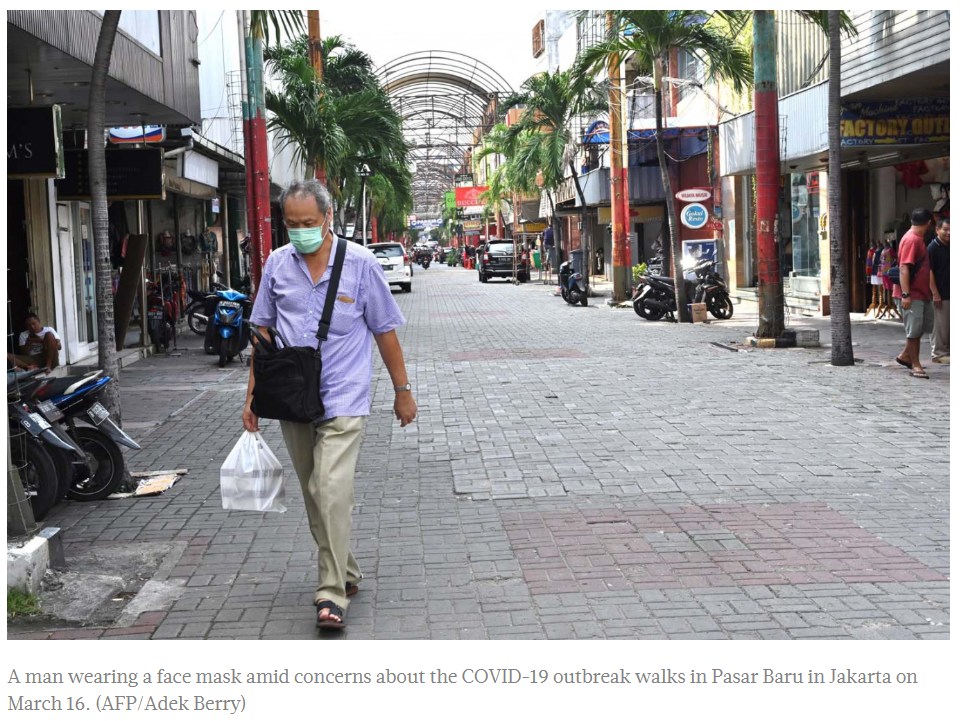Indonesia: Consumer spending to contract in 2020 as pessimism takes hold
Indonesia’s household spending is expected to contract this year as consumers turn pessimistic amid the COVID-19 pandemic, which has disrupted businesses and wiped out jobs.
Consumer spending, which accounts for more than a half of the country’s GDP, grew by just 2.84 percent year-on-year (yoy) in the first quarter, a far cry from 5.01 percent growth recorded in the same period last year.
Indonesia’s consumer confidence index (IKK) nosedived to its lowest level in at least 12 years as consumers expressed pessimism amid the pandemic, a Bank Indonesia (BI) survey showed on Wednesday.
The index fell to 84.8 in April from 113.8 in the previous month, indicating pessimism among consumers regarding the domestic economy. An IKK reading above 100 reflects general hopefulness, while index values below 100 signify pessimism.
“Consumer optimism weakened following the social restrictions, which have reduced people’s income,” the survey result reads. “Declining consumer optimism also occurred as companies laid off their employees because of the COVID-19 pandemic.”
Over 2 million people lost their jobs as of April 20, according to data from the Manpower Ministry, as the government imposed large scale social restrictions to contain the virus spread, which disrupted business activity. The government estimate that 2.9 million to 5.2 million workers could lose their jobs during the outbreak, which would erase last year’s gains of 2.5 million new jobs.
“When Jakarta and Java in general implemented large-scale social restrictions, it was inevitable that consumer spending would not grow and might even contract,” Finance Minister Sri Mulyani Indrawati told House of Representatives Commission XI overseeing financial affairs on Wednesday.
“We need to anticipate reduced consumer spending in the second quarter as the large-scale social restrictions take effect more broadly,” Sri Mulyani said, adding that Rp 5 quadrillion (US$333.39 billion) had vanished this year as people stayed at home while businesses closed.
Last year’s household spending amounted to Rp 9 quadrillion, with Java contributing 55 percent, more than Rp 5 quadrillion, Sri Mulyani said.
The government has allocated Rp 436.1 trillion for healthcare spending and a social safety net, as well as incentives for laid-off workers and businesses, among other things, as it works to soften the pandemic’s impact on the economy. Of this, Rp 110 trillion will be disbursed as social aid funds, which Sri Mulyani said would not be able to make up for the losses caused by the pandemic.
Indonesia’s economy grew 2.97 percent in the first quarter, the slowest pace in 19 years, as consumer spending and investment were battered by the virus. The growth was lower than the government’s, BI’s and economists’ projections of above 4 percent.
Fitch Solutions now projects the economy to contract 1.3 percent throughout this year from its previous expectation of 2.8 percent growth.
“We now expect private consumption to contract by 1.5 percent yoy in 2020 from a previous forecast growth of 1.2 percent and from 5 percent in 2019,” it wrote in a research note on May 6. It highlighted the fact that Indonesia’s economy did not actually face severe disruptions in the first quarter as the first COVID-19 cases were only detected in early March with no lockdowns imposed.
The steep drop in consumer spending growth, it added, suggested that external factors, such as a sharp slowdown in the Chinese economy and a fall in tourist arrivals dealt a severe blow to consumer spending. China is Indonesia’s largest trade partner while tourism accounts for around 10 percent of GDP.
“We do expect consumption to weaken during [Ramadan] and the Eid festival that will follow as COVID-19 awareness rises and people gradually start avoiding crowded places,” Fitch wrote. “Secondly, we believe that private consumption will remain under pressure over the year as employment conditions continue to worsen.”
Perbanas Institute economist Piter Abdullah said the government should focus its efforts to contain the virus crisis in a bid to inspire optimism among consumers.
“This [reduced consumer spending] is inevitable during the COVID-19 outbreak, but the key is to immediately end the pandemic,” he stressed.
Source: https://www.thejakartapost.com/news/2020/05/08/consumer-spending-to-contract-in-2020-as-pessimism-takes-hold.html


 Thailand
Thailand




